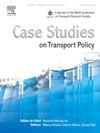Impacts of electric vehicles and environmental policy stringency on transport CO2 emissions
IF 3.3
Q3 TRANSPORTATION
引用次数: 0
Abstract
This paper aims to fill the existing gap in the literature by examining the roles of electric vehicles (EVs) and the stringency of environmental policies in reducing carbon emissions from transportation. Using a novel method of moment quantile regression (MMQR), this study investigates the impacts of EV adoption, environmental policy stringency, economic growth, commercial transportation services, and renewable energy on transport sector’s CO2 emissions. The results indicate that the influence of EV adoption on transport emissions varies across different quantiles. While the adoption of EVs is not significantly associated with transport CO2 emissions at the high quantile level, a significant relationship is found in the low and middle quantiles. More importantly, transport CO2 emissions demonstrate a significant negative correlation with the stringency of environmental policies across all quantiles. Our results highlight that the combined impacts of EVs and stringent environmental policies are more pronounced in alleviating carbon emissions compared to their individual effects. These findings hold intriguing implications for policy discussions, suggesting that EVs, along with rigorous environmental policies, offer a viable pathway to mitigate carbon emissions in the transportation industry. Furthermore, this study confirms the existence of an inverted U-shaped Kuznets curve in the context of the relationship between economic growth and transport-related emissions, implying that policies promoting economic growth might be seen as environmentally sustainable in the long term.
电动汽车和环境政策的严格性对交通运输二氧化碳排放的影响
本文旨在通过研究电动汽车(EV)和环境政策的严格程度在减少交通碳排放方面的作用,填补现有文献的空白。本研究采用矩量回归(MMQR)的新方法,研究了电动汽车的采用、环境政策的严格程度、经济增长、商业运输服务和可再生能源对交通部门二氧化碳排放的影响。研究结果表明,电动汽车的采用对交通部门二氧化碳排放的影响在不同的量级上有所不同。虽然在高量化水平上,电动汽车的采用与交通部门的二氧化碳排放量没有显著关系,但在低量化和中量化水平上,两者之间存在显著关系。更重要的是,在所有量级中,交通二氧化碳排放量与环境政策的严格程度呈显著负相关。我们的研究结果表明,电动汽车和严格的环境政策对减少碳排放的综合影响比它们各自的影响更为明显。这些研究结果对政策讨论具有引人入胜的意义,表明电动汽车与严格的环境政策一起,为减少交通行业的碳排放提供了一条可行的途径。此外,本研究还证实,在经济增长与交通相关排放之间存在倒 U 型库兹涅茨曲线,这意味着促进经济增长的政策可能被视为具有长期环境可持续性。
本文章由计算机程序翻译,如有差异,请以英文原文为准。
求助全文
约1分钟内获得全文
求助全文

 求助内容:
求助内容: 应助结果提醒方式:
应助结果提醒方式:


